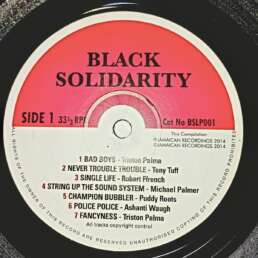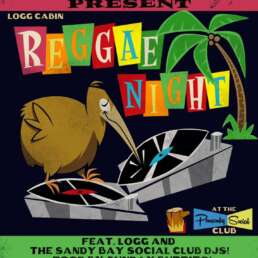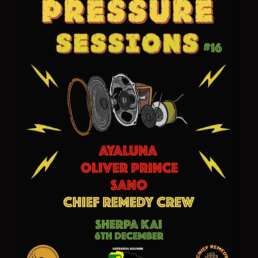On first encountering Jahtari back in 2008 before having even listened to any of their music, I was sure I had stumbled upon something pretty good. The name alone was sheer brilliance, as were the low pixal-rate Atari style graphics on their website.
Sure enough upon hearing their anomalous laptop-crafted dubs, released on free Net 7″s, I became enamoured with what was at the time an obscure online label run by a couple of Germans from Leipzig named Disrupt and Rootah.
These were chaps from a techno music background who had a strange obsession with 80s video games. They had only recently begun dabbling with reggae after discovering the joys of dubwise music through Berlin-based Rhythm and Sound. Their early riddims weren’t flawless, they had a distinct bedroom producer feel about them. But the ethos behind their sound grabbed me.
In contrast to so many tacky contemporary productions doing a sub-par job of faking a live roots sound, it was something of a revelation to hear unequivocal reggae music that proudly embraced its computerised mode of production. Jahtari were the original purveyors of the ‘digital laptop reggae’ sound.
In late 2008 they released their first album, ‘Jahtarian Dubbers Vol 1’ – a manifesto which included works not just by Rootah and Disrupt, but also a number of cohorts with a similar musical mindset such as Illyah and LTD Candy, Blue Vitirol and John Frum. The album was still a bit rough around the edges, but it frequently demonstrated brilliant ideas and contained the modern classic ‘Power in the World’ – Rootah’s exceptional collaboration with Afrikan Simba.
In 2010 ‘Dubbers Vol. 2’ dropped. By this time they had begun pressing to vinyl and their sound was rapidly growing in both popularity and quality. The production values were distinctly higher than earlier efforts and the riddims held a deeper connection to reggae traditions, especially 80s digital dancehall culture.
It was a seminal release which showcased not only the rising fortunes of Disrupt and Rootah, but also a number of emerging talents they had recruited such as Pupa Jim, MAFFI, El Fata, Tapes, Solo Banton and Soom T.
Fast forward another two years and today the lads from Jahtari, the digital laptop reggae sound they pioneered and many of the artists they helped expose, are in demand accross the globe. These two unlikely Germans – essentially a couple of computer geeks with a fondness for ganja – are at the vanguard of what is arguably one of the most exciting developments in recent reggae history (whether garden variety reggae-heads realise it or not). So it’s fair to say the release of ‘Dubbers Vol. 3’ is a pretty bloody important event.
The journey begins with 80s UK digi dancehall legend Mikey Murka singing ‘Sweeter’ on a crisp Disrupt riddim. The sound is indeed sweeter – delicately crafted, yet extremely hard hitting. The brilliantly subtle change ups in the riddim are also worthy of mention.
Next in line, Frenchman John Frum (named for the infamous and elusive figurehead of Vanuatu’s Cargo Cult) serves up a perfect example of his strangely uplifiting yet slightly melancholic organ-based sound with ‘Healing Dub’.
Frum appears again on the third track, this time it’s his ‘May in Dub’ riddim (taken from the original ‘Dubbers Vol. 1’) but with the happy addition of Soom T on the mic. Soom completely reinvigorates what was a slightly introspective piece of music and turns it into a battle cry of righteous indignation against the ubiquitous forces that seek to corrupt and oppress us with violence and intimidation.
Then an Ocker named Monkey Marc makes his first appearance for Jahatari. It was the first I had heard of him but apparently he has a reputation that proceeds him with productions for Roots Manuva and collaborations with rapping Aboriginal yutes from the Outback. ‘Rudebwoy Dub’ is sort of how I would imagine a Madlib tune would sound if he turned his hand to dubbing. It has strong left-coast hip hop flavours and heavy basslines notable for what I believe those crazy cats in the dubstep world refer to as a ‘second drop’.
MAFFI, the Danish dancehall production duo who have flourished as a subsidary of the Jahtari label then join the fray alongside Israeli deejay Ranking Levy on the eccentric ‘Mad Man Style’. The riddim clearly demonstrates MAFFI’s no bullshit approach to production – it’s simple but deadly, paying homage to King Tubby’s classic Firehouse style. What’s more Ranking Levy’s foundation deejay stylings are impeccable – you would never guess this guy was straight out of Tel Aviv.
Jahtari co-founder Rootah’s remix of an Adrian Sherwood-produced Lee Scratch Perry tune is an unexpected feature. Rootah seems to be a dab hand at the art of remix (judging by his previous efforts) and this one is particularly good. With it’s scintillating digital bassline and Jammys style keyboard skank.
Rootah then teams up with his co-conspirotor Disrupt to form the all powerful Jahtari Riddim Force (a nod to the influence of Lloyd Bullwackie Barnes, who often released dubs under the name Wackies Riddim Force). ‘One Armed Swordsman’ is an action packed riddim that to my ears seems to demonstrate Jahtari’s shift towards more analogue hardware-based production. (Given that every man and his troupe of rabid canines are now jumping on the digital reggae dubwagon, it’s a logical and pleasing progression).
Track eight sees our old friends Mungo’s Hi Fi in what is suprisingly their first ever appearance on the Jahtari label, given their close relationship with Jahtari over the years. The Glaswegian soundsystem champions are joined by veteran Studio One toaster Jim Nastics on an uptempo Mungo’s riddim with a delightfully detuned bass line.
New Zealand’s very own Tapes follows that with an unforeseen collaboration with Nigerian fast-chat merchant El Fata on the classic ‘Gold Love Riddim’. Tapes seldom works with vocalists and his abtruse low fidelity riddims aren’t what you’d typically associate with lyrics bigging up the sexy bodies of gyal’s inna di dance. But the incongruity of the cominbation makes ‘Dancehall Girls’ all the more quirky, and thus more enjoyable as far as I’m concerned.
Track ten, ‘Asteroid Dub Force’ is one from Disupt’s archive. I previously heard it years ago on a live to air soundclash between Disrupt and MAFFI on the excellent but soon to extinct BBC ‘On the Wire’ radio show. It’s a low-bitrate scorcher with an intro that could well be source code being transmitted by a force of robotic alien invaders.
The curtains are drawn on the album with a wonderful Rootah track called ‘Mr Vibes’. Rootah seems to love Wackies, often versioning their riddims on other releases. I don’t recognise this particular riddim, but with it’s delicate, eery production, ‘Mr Vibes’ might well have come from the mixing desk of the Wackies’ Brooklyn studio in the early 80s.
To sum up then, ‘Dubbers Vol. 3’ is a crucial piece of wax that will no doubt further the digital reggae indoctrination process, ideally reprogramming the unconscious minds of the masses with echo and bass and ultimately facilitating the conquest of mankind by a race of SID chip-powered musical robots who will enslave all human beings. Except for the lucky few who can prove their long-standing abhorrence of the mundanity of modern pop music and the pervasive Babylonian forces that perpetuate such rot.
More info:
Jahtari website
Naram
Related posts
Triston Palma – Bad Boys – Track of the Week
November 17, 2025
Logg Cabin Reggae Night – Sun 30 Nov
November 10, 2025
Pressure Sessions – Sat 6 Dec
November 6, 2025




